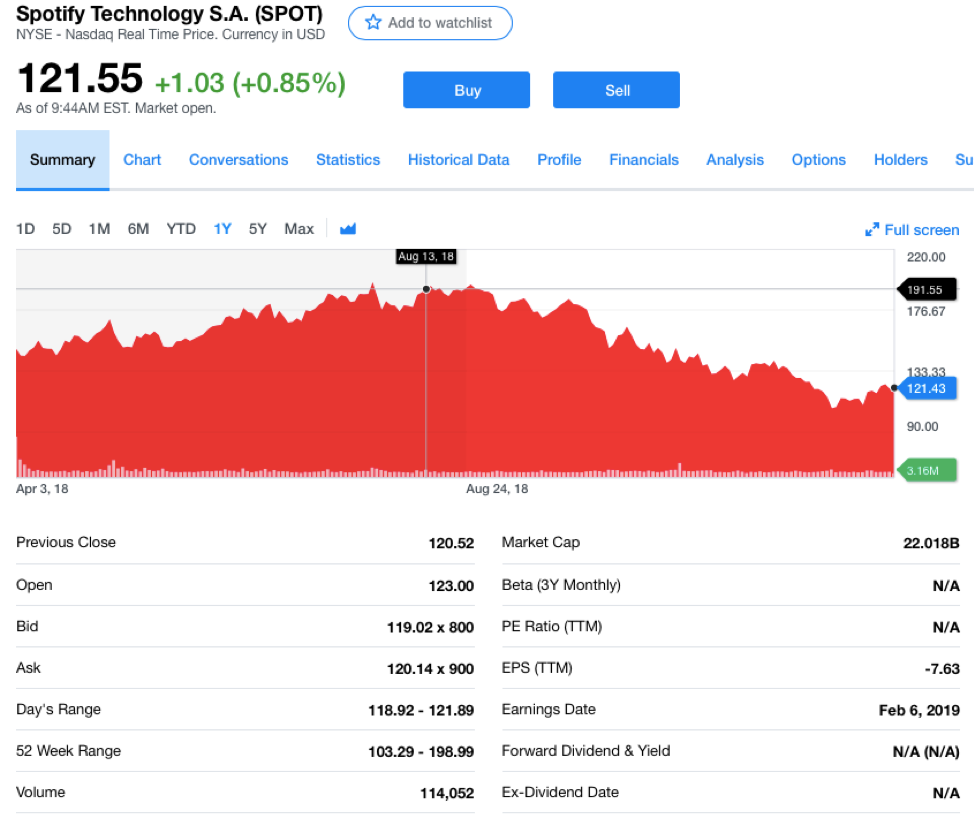Slack, the company messaging app platform with a potential $7-billion valuation may follow the footsteps of music industry ‘savior’ Spotify and go for a direct listing instead of an IPO this year, according to several media reports.
According to reports in both the Wall Street Journal and Financial Times, Slack has considering plans to list its shares directly in the second quarter of this year, skipping the IPO underwriting fees and allowing shareholder to start trading immediately, with no lockup period.
Arguably, it worked for Spotify (NYSE:SPOT), which ended its first day on trading on the NYSE last year with a valuation of $26.6 billion.

(Click to enlarge)
It’s dropped to a market cap (as of 14 January) of just over $22 billion since then, but that’s more in line with an overall equities route in the fourth quarter of 2018 than it is a testament to going for a direct listing.
Spotify bypassed the some $300 million in costs associated with an IPO, and it’s pre-listing valuations were anywhere from $23 billion to $30 billion. After a year on the exchange, it’s fair to say that Spotify lived up to its valuation in the interim. Related: Russia’s Post-Soviet Calendar Boy
Having launched its music streaming service in 2008, at the time of direct listing, Spotify had nearly 160 million monthly active users and some new record deals in the pipeline that promised to lower its costs exponentially. Spotify just reworked contracts with major record labels that will improve its bottom line by paying record labels less in fees for the music its users stream. It also had just over 70 million paid subscribers globally at the time, and plans to surpass the 100-million subscriber mark this year.
In November, Spotify hit 200 million users and 87 million paid subscribers, but we won’t see Q4 2018 results until February 2.
Slack isn’t quite at the ‘savior-of-any-industry’ level, as Spotify is said to be for music. And at its much lower valuation of around $7 billion, saving $300 million in IPO fees is an even bigger thing.
Spotify may have started a trend, and Slack may be the first to pick up on it. But it’s not just about IPO costs and dilution of shares, it’s about timing.
“Slack’s direct listing is an inherently less expensive way of going public, but what it really comes down to is speed,” Daniel Lugasi, a portfolio manager at Florida-based VL Capital Management, told Reuters.
In a total of 11 funding rounds to date, Slack has raised around $1.2 billion with 36 investors, including SoftBank most notably, according to Reuters. And it’s biggest rival will be Microsoft Teams, a company messaging platform attached to Office365.
And this, Lugasi points out, is also a good reason to speed up the process. Investors are now “looking for an exit and with the rapid growth of Microsoft Teams, they want out fast”.
And Slack is, well, not slacking. Not only has it managed to raise around $1.2 billion, but it’s got its own in-house venture capitalist arm investing in other companies, as Axios points out.
Related: If It’s Digital, It’s Vulnerable
Softbank, for one, won’t be horribly disappointed if Slack lists directly on the exchange and share prices don’t immediately take off. There’s enough interest in the messaging platform that would probably see Softbank simply buy up more shares while prices are low.
And this is Saudi money, for anyone not familiar with Softbank—which also means that it comes with some reputational baggage. Listing directly simply means that Softbank can up its shareholding in Slack quietly.
As Matt Levine notes in an opinion piece for Bloomberg, if Slack follows Spotify down this road, then it’s more likely to start a real trend.
“Other tech companies considering going public won’t think ‘should we do that weird thing that Spotify did’ but rather ‘what are the pros and cons of direct listings compared to initial public offerings?’ Investment banks will—reluctantly!—put together pitchbook pages explaining direct listings and touting their own credentials at leading them.”
By Michael Scott for Safehaven.com
More Top Reads From Safehaven.com
















